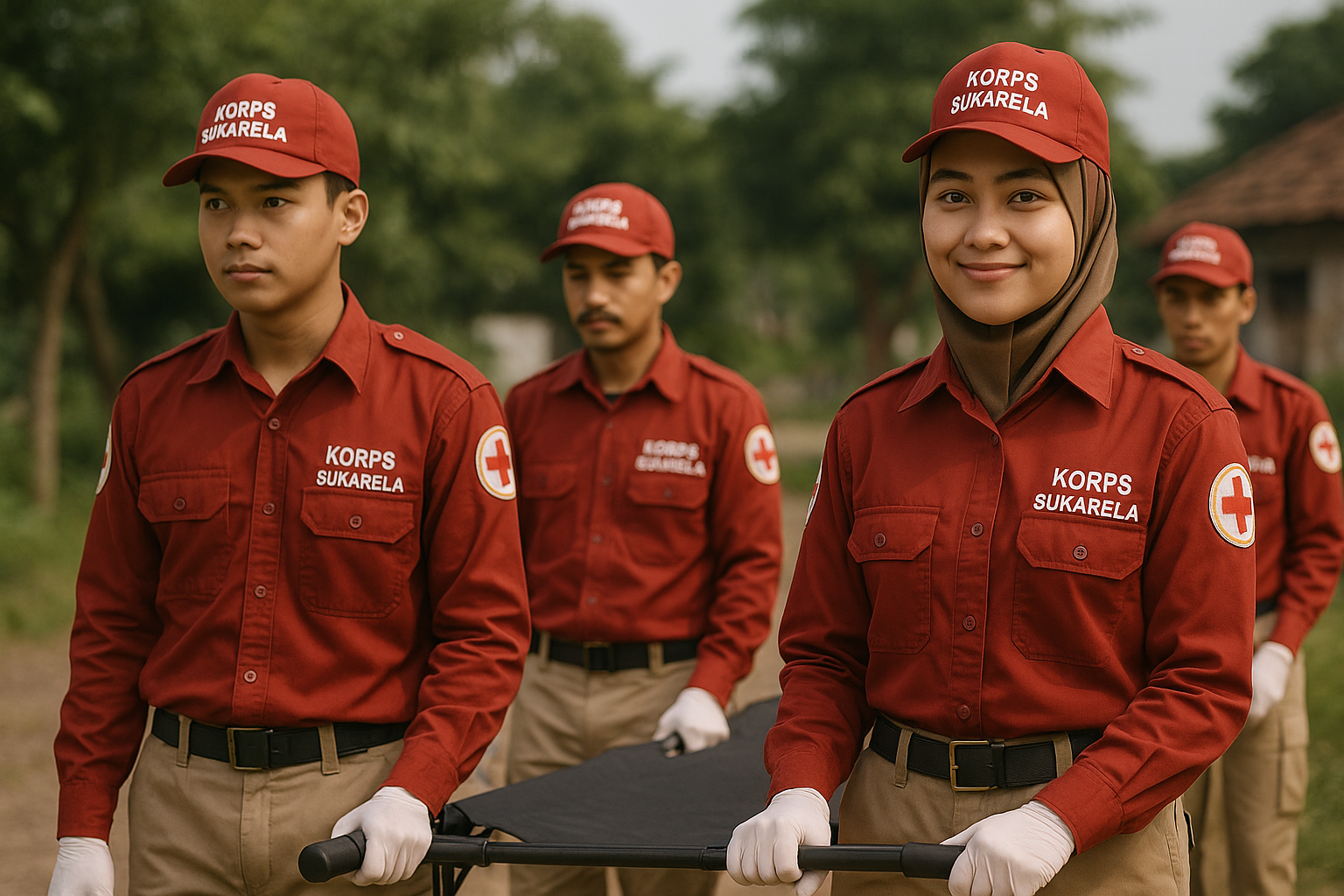Introduction: What Is Korps Sukarela?
Korps Sukarela, often abbreviated as KSR, is a volunteer corps in Indonesia that operates under the aegis of the Indonesian Red Cross (Palang Merah Indonesia, PMI). Its name literally means “Volunteer Corps,” and its mission centers on mobilizing citizens for community service, disaster response, health outreach, and social welfare. As a structured network of volunteers, Korps Sukarela plays a vital role in bringing organized humanitarian action to local communities across Indonesia.
Origins and Evolution
The idea of volunteer service in Indonesia has deep roots in the cultural value of gotong royong (community cooperation). Korps Sukarela was formalized within PMI to give that spirit institutional support. Over time, it evolved into a nationally recognized structure with local branches tied to city or district Red Cross offices, as well as units in colleges and high schools. This evolution enabled volunteers to transition from ad hoc efforts to ongoing training and coordinated responses.
Core Values and Principles
At the heart of Korps Sukarela lie several guiding values: humanity, neutrality, independence, volunteerism, unity, and impartiality. These principles mirror those of the broader Red Cross / Red Crescent movement and emphasize serving all people without discrimination, maintaining autonomy from external pressures, and committing voluntarily rather than for compensation. Those values shape how KSR operates in communities.
Structure and Membership
Korps Sukarela is organized through PMI branches at provincial, city, and district levels, often collaborating with university units or youth Red Cross organizations. To join KSR, one must generally be at least 18 years old (some units allow younger participants in associated youth wings), hold a minimum education level, be physically and mentally healthy, and commit to training and service. After completing basic training, members can advance to specialized roles, such as disaster squads or health outreach teams.
Training and Capacity Building
New KSR recruits undergo a basic training program (diklat) that covers first aid, basic life support, disaster risk reduction, logistics, communication, and organizational ethics. After this, advanced or specialist training may follow, such as joining “Satgana” (disaster readiness squads) or participating in domains like water and sanitation, psychosocial support, or mass casualty management. The well-developed training regimen ensures that volunteers are prepared for a diverse range of challenges.
Primary Activities and Services
Korps Sukarela’s activities span a broad spectrum. In disaster settings, volunteers may provide emergency first aid, manage shelters, distribute relief supplies, coordinate evacuations, or participate in family tracing (Restoring Family Links). In everyday times, they organize blood donation drives, health campaigns, youth education on HIV/AIDS and drug prevention, community cleanups, and life skills education. In universities, KSR units often spearhead social service projects in surrounding neighborhoods.
Role in Disaster Management
Indonesia’s geography makes it prone to earthquakes, floods, tsunamis, volcanic eruptions, and landslides. In such emergencies, Korps Sukarela often acts as a frontline volunteer force. Their structured relationship with PMI allows them to be mobilized swiftly, deploy locally, and integrate with broader relief operations. Their training in crowd handling, first aid, logistics, and shelter management makes them key contributors to mitigating the impact of disasters.
Impact on Public Health and Social Welfare
Beyond disaster response, KSR has a significant impact on public health and social welfare. Through blood donation drives, health education, and outreach in underserved areas, volunteers help boost community health resilience. Their youth peer counseling (remaja sebaya) programs also help in substance abuse prevention and awareness of sexual health. Over time, these contributions help reduce disease incidence and increase health literacy in communities.
Community Development and Environmental Engagement
Korps Sukarela doesn’t only act in emergencies—it also commits to longer-term community development. Projects include improving access to clean water, building community centers, participating in tree-planting and waste management campaigns, and running vocational or life-skill workshops. By maintaining steady engagement, KSR helps communities become more resilient, self-sufficient, and environmentally aware.
Case Examples and Local Units
Many Indonesian universities host active KSR units. For instance, KSR at Soegijapranata Catholic University coordinates blood drives, disaster awareness events, and training among students. (Data from Soegijapranata University indicate regular diklat and social service efforts.) In local municipalities, PMI offices periodically open recruitment for new KSR members, offering dozens of spots and requiring participants to complete 76 hours of basic training. In one city, Depok, PMI opened recruitment for 30 KSR slots in 2024, with eligibility requirements including an age range of 18–34, good physical health, and a willingness to undergo training. Depok News
Benefits to Volunteers
Joining Korps Sukarela offers multiple advantages, including practical skills training in first aid, disaster management, leadership, and teamwork; reputable civic credentials; networking with civic institutions; and meaningful opportunities to contribute to one’s community. Volunteers also often find personal growth, increased empathy, and a sense of purpose. For students, KSR involvement can enhance resumes or support scholarship applications.
Challenges and Limitations
Despite its successes, Korps Sukarela faces challenges. Maintaining consistent volunteer engagement over time can be challenging, especially as individuals balance work, studies, and other responsibilities. Resource constraints, such as funding, equipment, and logistical support, may limit capacity. In remote or underdeveloped areas, access to training or coordination can be weak. Also, in large-scale disasters, volunteer capacity may be overwhelmed without external support.
Future Directions and Innovations
Looking ahead, Korps Sukarela is likely to strengthen digital coordination—using apps or platforms to manage volunteer deployment, reporting, and logistics. Expanding specialization (e.g., drone mapping, data analysis, psychosocial care) may become more common. Partnerships with local governments, NGOs, and international aid agencies could deepen. Focusing on sustainability, climate resilience, and community-based disaster risk reduction is likely to increase as Indonesia faces mounting natural hazards.
Measuring Impact and Legacy
The true legacy of Korps Sukarela lies in lives saved, communities stabilized, and cultures of volunteerism cultivated. Metrics such as the number of disasters responded to, the volume of blood donated, the number of campaigns run, and the volunteer retention rates help quantify the impact. But beyond numbers, the enduring legacy is in citizens empowered to care for one another, the institutionalization of voluntary service in national life, and the example set for future generations of selfless service.
Conclusion – Korps Sukarela
Korps Sukarela stands as a powerful embodiment of organized volunteerism in Indonesia, rooted in values, discipline, and a commitment to the community. From disaster response to health outreach to environmental projects, KSR’s multifaceted work touches countless lives. For volunteers, it offers training, purpose, and a sense of belonging. As it adapts to modern challenges and innovates in coordination, Korps Sukarela’s influence is likely to grow stronger. For anyone considering community service, understanding and engaging with KSR offers a pathway to meaningful impact.




